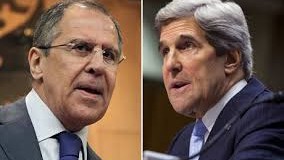Can Syrians trust the current US-Russia truce?
Camelia Entekhabi-Fard/Al Arabiya/September 13/16
From sunset on Eid al-Adha, one of the most celebrated holidays in the Muslim calendar, a truce began in Syria. The truce between the government and the opposition will be observed for 10 days while negotiations carry on with the US and Russia, with the UN acting as an observer. US Secretary of State John Kerry and his Russian counterpart Sergey Lavrov agreed on this 10-day ceasefire in Geneva on Friday September 9. Interestingly, despite many countries being involved in the Syrian war, none have been invited to the talks in Geneva despite their significant influence on the frontlines. Iran is one of those countries.
For its part, it cautiously welcomed the ceasefire on Sunday September 11 but also expressed concern and doubt regarding the truce. Iranian Foreign Ministry spokesperson Bahram Ghasemi said that the ceasefire should not be used as an opportunity to regroup or organize arms transfers to terrorist groups.Doubts about the truce. Iran does not recognize Syrian President Bashar al-Assad’s opposition and does not differentiate between them and terrorist groups such as ISIS and the al-Nusra Front, conversely to the international community.
The Syria peace talks need negotiations which include all parties affiliated with the conflict – all parties should be heard.
Considering such differences and taking into account the notion that the regime in Damascus will not accept any political transition or appease its long-suffering people, it is difficult to believe that this truce will last very long.
Hours before the truce began, Assad, who appeared in Daraya for Eid al-Adha prayers on Monday, vowed to retake all of Syria. Speaking in Daraya, a former rebel stronghold recently surrendered to the government, Assad said “the Syrian state is determined to recover every area from the terrorists.”The truce will last when the will for unification and peace-making drives all parties to negotiate for peace.
For its part, hardline Syrian rebel group Ahrar al-Sham didn’t accept the ceasefire which means that fighting will likely continue. Sparring between ISIS and the al-Nusra Front could also continue. As the Kurds, Saudi Arabia, Turkey and Iran have not been included in the talks between Russia and the US, keeping these influential key players committed to the ceasefire in the long term will also be difficult.
All parties should be heard
The Syria peace talks need negotiations which include all parties affiliated with the conflict – all parties should be heard. While Iran and Saudi Arabia are experiencing a particularly tense moment in relations, it is difficult to believe that the American viewpoint will be accepted by the Saudis. On the other hand, the Iranian camp has different views to Russia on the Syria talks. However, they have no choice but to follow Russia’s lead due to ruined relations with most Arab countries. The United Nations’ 71st General Assembly is due to begin this week and will host world leaders and high level diplomatic delegations in New York City. A conference about the refugee crisis, with an eye on the Syria conflict and its refugee issue, will start on September 19 just a few days before the current Syria ceasefire expires on September 22.
This is also an opportunity for Iran and Saudi Arabia to address their regional in New York, which is particularly important as this is Iranian President Hassan Rowhani’s last year in office. Will this truce hold and will the world put an end to this endless crisis?



















